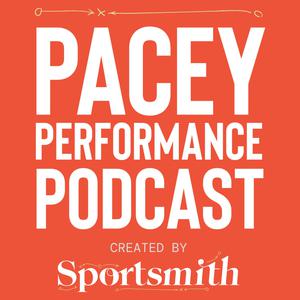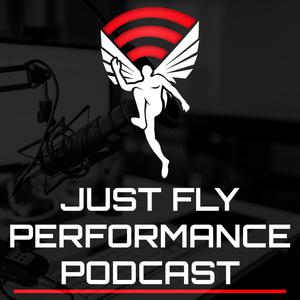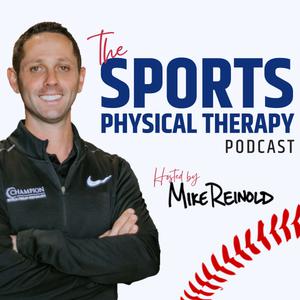
Pacey Performance Podcast
Robert Pacey
- 55 minutes 10 secondsHow to reduce hamstring injury risk with Matthew Bourne, Nick Court and Johan Lahti
In this episode of the Pacey Performance Podcast, Nick Court, Johan Lahti, and Matthew Bourne discuss strategies for reducing hamstring injury risk in elite football players, emphasizing the importance of individualized training, eccentric conditioning, and movement mechanics.
Despite advancements, hamstring injuries remain prevalent due to the increasing demands of high-speed running and eccentric contractions in sports. Eccentric training, particularly the Nordic hamstring exercise, has proven effective but remains underutilized due to compliance challenges and limited preseason time. Incorporating exercises like single-leg RDLs, hip extensions, and inertial training can further strengthen hamstrings and reduce injury risk.
Proper sprint mechanics and balanced strength between the iliopsoas and hamstrings are critical. Faulty mechanics, such as excessive backward thigh movement, can increase strain on the hamstrings. A multifactorial approach, combining practical assessments, running kinematics, and targeted exercises, is essential for addressing individual risk factors and improving movement efficiency.
Injury prevention also requires tailoring rehabilitation to each athlete’s needs, using tools like handheld dynamometers and pulley systems to assess hamstring strength and endurance. Movement constraints, joint torque, and muscle-tendon junction adaptations should be considered in rehabilitation plans. Training programs must balance high-speed running exposure, eccentric conditioning, and varied running techniques to enhance stiffness and reduce fatigue-related risks.
The podcast concludes that effective hamstring injury prevention relies on individualized strategies, incorporating both scientific evidence and practical tools, to address the unique demands and risks faced by elite athletes. These approaches ensure improved performance and reduced recurrence rates.
Main talking points:
- Integrate eccentric conditioning
- Tailor injury prevention to individual athlete needs
- Focus on proper sprint mechanics to reduce strain
- Strengthen iliopsoas and hamstring balance for stability
- Use single-leg RDLs and hip extensions for strength
- Assess running mechanics to identify risk factors
- Incorporate varied running techniques to enhance movement
- Monitor high-speed running exposure in training programs
- Improve stiffness and control during fatigued states
- Use tools like dynamometers to assess hamstring strength
- Develop structured rehab plans with clear progression
- Address movement efficiency and biomechanics in prevention.
16 January 2025, 4:19 pm - 54 minutes 40 secondsTesting and training deceleration and change of direction qualities with Charlie Faulkner
In this episode of the Pacey Performance Podcast, Charlie Faulkner discusses the critical importance of deceleration and change of direction (COD) in sports performance, emphasizing tailored training approaches and practical experience. Charlie highlights his journey in coaching, where understanding the demands of each game and the specific movement qualities required has been central to his philosophy.
Deceleration and COD are essential biomotor qualities that influence high-intensity actions in sports like football and tennis. Effective COD relies on mechanics such as a strong penultimate step and ankle elasticity. Charlie explains how profiling athletes through tools like the modified 505 test, opto jump, and Sprint 1080 provides valuable insights into their movement capabilities and limitations.
Video analysis and scoring systems, such as the CMAS scoring system, are used to assess movement mechanics and identify potential injury risks. Charlie emphasizes the importance of evaluating asymmetries, knee abduction moments, and early braking to better understand and address performance issues.
Training strategies should focus on targeted muscle adaptations and movement mechanics, using drills that replicate match conditions. Strengthening specific muscles, like the vastus lateralis and calf, and employing exercises such as kettlebell swings and targeted hopping drills can improve deceleration and COD efficiency.
Charlie advocates for individualized programs that consider the demands of each sport and athlete. High-force training, reactive hops, and tailored rehab strategies are vital for enhancing performance while preventing injuries. His approach underscores the value of continuous assessment and reflection to refine training outcomes.
Main talking points:
- How to assess deceleration
- Using video analysis to evaluate movement mechanics
- Addressing asymmetries in athlete movement profiles
- Training the penultimate step for better braking efficiency
- Incorporating reactive drills to improve COD efficiency
- Monitor knee abduction moments to prevent injuries
19 December 2024, 5:00 am - 1 hour 4 minutesOptimising eccentric focused training to run faster and jump higher with Angus Ross
In this episode of the Pacey Performance Podcast, Rob is joined by Angus Ross who explores the significance of eccentric training in sports performance and injury prevention, offering insights into its application and benefits. With a background in speed and power sports, Angus shares his journey from an athlete and physiologist to an elite strength coach, emphasizing the importance of hard work and innovative methods in training.
Eccentric training, which combines high velocity and force, is highlighted as a critical tool for athletic development. Angus discusses its unique ability to promote muscle fiber adaptations, specifically a shift towards type 2b fibers, which enhance power and speed. However, he cautions that improper management of eccentric training can lead to muscle damage and hinder performance, stressing the need for carefully structured regimens.
Innovative devices like flywheel systems are increasingly used to facilitate controlled eccentric loading, particularly in sports requiring speed and explosive power. Angus advocates for tailored approaches to eccentric training, recognizing individual differences in athlete needs, strengths, and recovery capacities. He also highlights the importance of avoiding over-reliance on advanced techniques with younger athletes, instead focusing on foundational strength and technique.
Angus emphasizes that eccentric training is not a standalone solution but an integral part of a holistic approach to athletic development. By balancing eccentric work with other modalities and carefully managing load during competition periods, coaches can optimize performance while minimizing injury risks. Angus encourages critical thinking in training methodologies and fostering discussions for mutual growth and learning.
Key talking points:
- How to integrate eccentric training to enhance power and speed.
- Tailor eccentric regimens to individual athlete needs.
- Using flywheel systems for controlled eccentric loading.
- Managing eccentric load to prevent muscle damage.
- Balancing eccentric work with other training modalities.
- Incorporating high-velocity, high-force exercises for adaptation.
- How to address athlete recovery during competition periods.
- Optimize power-to-weight ratio in acceleration training.
- Include rotational movements for team sport athletes.
28 November 2024, 12:26 pm - 57 minutes 41 secondsEnhance athlete performance profiling through MRI with Bryan Heiderscheit, Fearghal Kerin & Emidio Pacecca
In this episode of the Pacey Performance Podcast, Rob is speaking to Bryan Heiderscheit, Fearghal Kerin and Emidio Pacecca. The topic of this conversation is all around MRI and its use in athlete performance profiling. MRI scans are usually thought of an expensive tool that is used when an athlete gets injured. But in this episode we break down those barriers and disciver how they can be used, through technology like Springbok Analytics, in other ways to improve performance and mitigate injury risk with healthy athletes.
First we discuss MRI and what it actually is. Bryan gives us some great examples of where it can be used and why. Fearghal and Emidio then give us some amazing insights from the world of elite sport on how MRI scans are actually being used. But most importantly, they give us the real key information which is what we do with the information once we have it.
If you're trying to reduce injury risk and optimise performance, check out this episode.
21 November 2024, 4:52 pm - 1 hour 7 minutesImplementing isometric training for performance and rehab with Alex Natera, Danny Lum & Matt Taberner
In this episode of the Pacey Performance Podcast, Rob is speaking to Alex Natera, Danny Lum, and Matt Taberner to discuss the role of isometric training in sports performance and rehabilitation, focusing on its ability to enhance strength, recovery, and dynamic performance.
Isometric training is increasingly recognized for its utility in sports, especially given the challenge of maintaining effective strength training amidst intense competition schedules. It is effective for improving muscle stiffness, tendon adaptation, and managing recovery, making it essential for injury prevention and rehabilitation. The guests emphasize that isometric training, when paired with plyometric exercises, enhances both muscle and tendon resilience, supporting performance in high-intensity sports.
The speakers advocate for using isometric exercises throughout rehabilitation, adjusting the approach to address specific joint weaknesses, and tailoring it to each athlete’s unique needs. For instance, using force evaluations for joints like the ankle, knee, and hip allows practitioners to target weak points effectively.
Data integrity is crucial for isometric assessments, and techniques like pre-tensioning and accurate joint positioning help ensure reliable results. Tools such as iso straps, strain gauges, and handheld dynamometers facilitate precise assessments, helping coaches to optimize training and monitor fatigue.
Alex, Danny and Matt conclude that isometric training, when thoughtfully applied, is a powerful tool for boosting athletic performance, preventing injuries, and enhancing rehabilitation, providing coaches with versatile methods to address the needs of individual athletes effectively.
14 November 2024, 4:00 am - 42 minutes 31 secondsUtilising normative data effectively across different technologies with Luke Fitzpatrick
In this episode of the Pacey Performance Podcast, Luke Fitzpatrick, Head of Data Science at VALD, discusses the role of data science in sports technology and the importance of data quality and security. He explains the process of generating normative data and how clients can get the most out of their data. Luke also shares interesting insights, such as the age at which adolescents experience the largest strength development and the average strength of NFL players compared to the general population. The data science team at VALD is focused on expanding their product suite and providing more valuable insights to clients.
This episode is different to any that we have done over the last 10 years.
New talking points:
- The role of a data scientist at Vald
- Data quality and security
- Accessing VALD testing data
- Managing huge amounts of data
- Visualizing normative data
- Making the most of your data
19 September 2024, 4:00 am - 46 minutes 15 secondsInjury prevention: Integrating “best practice” to reduce hamstring injuries with Nick van der Horst
In this episode of the Pacey Performance Podcast, Rob is speaking to Rehabilitation Coordinator at PSV Eindhoven, Nick van der Horst. Nick shares his journey from aspiring footballer to sports physiotherapist, where he now focuses on rehabilitation at PSV Eindhoven.
Nick advocates for preseason screenings that assess isometric strength, mobility, and contralateral limb function to identify individual risks. He also highlights the importance of iliopsoas mobility for hamstring flexibility and sprint performance. Tailored training strategies and post-game eccentric exercises also play a key role in preventing injuries.
Nick emphasizes individualized approaches in both prevention and rehabilitation. Mini-dosing and eccentric training in fatigued states, along with structured recovery phases, help build resilience and reduce injury risk. He also stresses the importance of avoiding ineffective methods like cupping and dry needling in favor of mobility and flexibility work for better energy transfer during athletic performance.
Nick stresses that personalized strategies, including eccentric exercises and load management, alongside strong communication with players, are key to reducing hamstring injuries in athletes.
Main talking points:
• Eccentric strength training crucial for injury prevention
• Personalize load management to each athlete's needs
• Conduct preseason screenings for hamstring injury risks
• Focus on iliopsoas mobility for sprint performance
• Tailor training strategies to individual player profiles
• Use post-game eccentric exercises for recovery
• Apply mini-dosing in fatigued states for injury prevention
• Strengthen pelvic mobility for energy transfer efficiency.11 September 2024, 4:00 am - 53 minutes 52 secondsAssessing sprint technique - does it even matter? with Johan Lahti
In this episode of the Pacey Performance Podcast, Johan Lahti discusses the complexities of assessing sprint technique in relation to hamstring injury risk. While technology has made sprint assessment more accessible, measuring its impact on injury risk remains challenging, and Johan questions whether it's always worth the effort. However, he emphasizes the importance of focusing on key aspects of technique, such as minimizing time under tension and analyzing movement patterns like overstriding or increased hip flexion, which can lead to hamstring issues.
Johan highlights that sprint assessments should consider the entire movement cycle, as isolated 2D assessments may miss critical factors like pelvic movement. He notes that technique assessments do not always predict performance or injury risk accurately, stressing the need to address both movement patterns and physical strength. Strengthening key muscle groups, especially the glutes and hamstrings, is vital for maintaining sprint technique, particularly under fatigue, which can help reduce injury risk.
He also discusses the rising prevalence of hamstring injuries due to increased high-speed sprinting in professional sports. He advocates for teaching sustainable sprint techniques to young athletes to develop overall athleticism and prevent future injuries. Force-velocity profiling is also mentioned as a valuable tool for identifying athletes' strengths and weaknesses in sprinting.
While assessing sprint technique is valuable, it must be done holistically and integrated with strength training to minimize hamstring injury risk and improve performance.
Main talking points:
• Focus on key aspects of sprint technique
• Minimize time under tension during sprinting
• Analyze entire movement cycle for injury risk
• Address overstriding and increased hip flexion
• Assess sprint technique in a fatigued states
• Teach sustainable sprint techniques to young athletes
• Develop strength and movement variability early
• Train sprint form to reduce hamstring strain
• Incorporate sprint assessments with strength training5 September 2024, 4:00 am - 58 minutes 24 secondsDebunking misconceptions about female health and sports performance with Charlie Pedlar
In this episode of the Pacey Performance Podcast, Professor in Sport and Exercise Science, Charlie Pedlar delves into the importance of understanding the unique physiological responses of female athletes to optimize their health and sports performance. He highlights the progress made in recent years, particularly in recognizing the impact of menstrual cycles and iron deficiency on female athletes.
Charlie explains that menstrual cycles, which were often overlooked in the past, play a crucial role in influencing athletic performance. Tracking these cycles can help athletes anticipate and manage the physiological changes that occur, allowing for more tailored training approaches. He emphasizes that iron deficiency is prevalent among female athletes due to menstrual blood loss and poor iron absorption, significantly affecting endurance and overall performance.
The discussion also covers the challenges of linking individual symptoms to menstrual cycles, as hormonal fluctuations can produce a wide range of effects. Charlie advocates for individualized training plans that consider each athlete's unique cycle, rather than blanket recommendations, to maximize performance and recovery.
He also addresses common misconceptions about female health, such as the oversimplification of training strategies and the potential negative impacts of hormonal contraception. He calls for more research focused on individual variations and the role of nutrition across the menstrual cycle, stressing the need for tailored approaches in both training and health management.
The podcast underscores the critical need to integrate a deeper understanding of female physiology into sports performance strategies to enhance the health and success of female athletes.
Main talking points:
- Track menstrual cycles to optimize training
- Address iron deficiency in female athletes
- Tailor training to individual menstrual cycles
- Recognize menstrual symptoms and adjust accordingly
- Focus on individualized strategies, not blanket recommendations
- Use tracking tools for accurate cycle predictions
- Educate athletes on menstrual cycle impact
- Avoid relying solely on hormonal contraception
29 August 2024, 5:00 am - 1 hour 2 minutesIts not all about tech: Developing your coaching eye within a speed-based approach to rehab with Alan Murdoch
In this episode of the Pacey Performance Podcast, Alan Murdoch discusses the "fast to fit" approach to rehabilitation. Alan advocates for prioritizsng movement assessment over tests, underscoring the value of a strong coaching eye in identifying and addressing underlying issues in athletic movement. This approach allows for more targeted interventions, enhancing the effectiveness of rehabilitation.
The "fast to fit" approach focuses on incorporating high-intensity actions early in rehab, aiming to develop necessary coordination and expedite recovery. This contrasts with traditional methods that emphasize building volume before speed, which can delay the athlete's return to peak performance.
Frameworks like the Compass Protocol and Prep with Purpose are central to this approach, enhancing decision-making and creativity in fast-paced rehab settings. These frameworks prioritize dynamic warmups, visual assessments, and targeted drills to improve hip mobility, function, and overall athletic performance.
Alan's "fast to fit" approach offers a dynamic and effective method for athlete rehabilitation, emphasising speed, coordination, and innovative coaching techniques to ensure athletes return to their pre-injury performance levels quickly and effectively.
If you are interested in the fast to fit online course, check it out here.
Main talking points:
- Prioritize movement assessment over traditional tests
- Develop a strong coaching eye for effective rehab
- Use video analysis to identify movement asymmetries
- Incorporate high-intensity actions early in rehab
- Apply the fast to fit approach for faster recovery
- Use frameworks like Compass Protocol in coaching
- Address compensatory movements during rehabilitation
- Enhance coaching creativity with structured frameworks
- Emphasize purposeful drills for athlete performance
22 August 2024, 4:00 am - 49 minutes 14 secondsLeading a performance department in a multi club ownership structure with Kasper Thornton
n this podcast, Kasper Thornton, Group Director of Human Performance at Right to Dream, discusses the complexities and strategies involved in leading a performance department across multiple clubs. He emphasizes a "person-first" approach, where selecting candidates based on mindset, values, and team fit is prioritized over mere technical skills. This approach is crucial in developing a cohesive and effective performance department across multiple clubs, each with its unique culture and challenges.
Kasper shares his journey from a physiotherapist to his current leadership role, highlighting the growth of his organization from a small Danish club to a multinational operation with branches in Ghana, Egypt, and San Diego. A significant focus is on building top-notch facilities and developing talent, particularly in the soccer academies associated with these clubs.
He outlines the challenges of recruiting and onboarding personnel across different time zones and cultures, stressing the importance of soft skills and cultural fit in building a successful team. Kasper also discusses the need for an overarching strategy that aligns all clubs within the ownership group, while respecting their individual identities and operational contexts.
The recruitment process is streamlined with the help of recruitment agencies, and a grading system is used to ensure the best candidates are selected. Regular staff meetings and global collaboration are key to maintaining alignment and driving continuous improvement within the department. Overall, the podcast provides valuable insights into the strategic and operational aspects of leading a performance department in a multi-club ownership structure, with a focus on people, culture, and continuous development.
Main talking points:
- Prioritise a person-first approach in recruitment.
- Focus on mindset and values in candidates.
- Align clubs with an overarching performance strategy.
- Adapt recruitment to different cultures and contexts.
- Emphasize soft skills over hard skills.
- Encourage global collaboration across all clubs.
- Plan for internal succession and staff development.
15 August 2024, 4:00 am - More Episodes? Get the App
Your feedback is valuable to us. Should you encounter any bugs, glitches, lack of functionality or other problems, please email us on [email protected] or join Moon.FM Telegram Group where you can talk directly to the dev team who are happy to answer any queries.
 Just Fly Performance Podcast
Just Fly Performance Podcast
 Inform Performance
Inform Performance
 JOSPT Insights
JOSPT Insights
 The Sports Physical Therapy Podcast
The Sports Physical Therapy Podcast
 BJSM Podcast
BJSM Podcast
 Power Athlete Radio
Power Athlete Radio